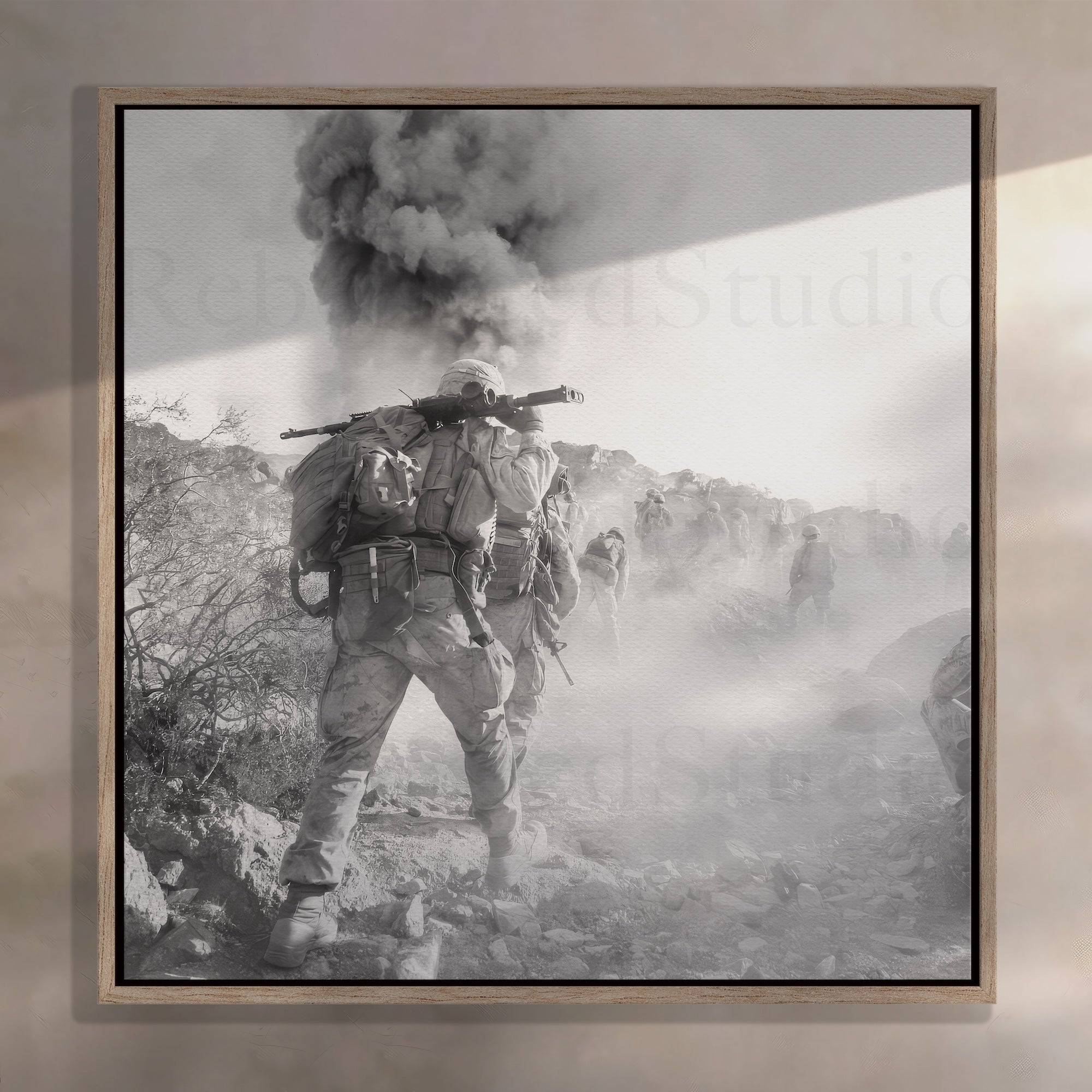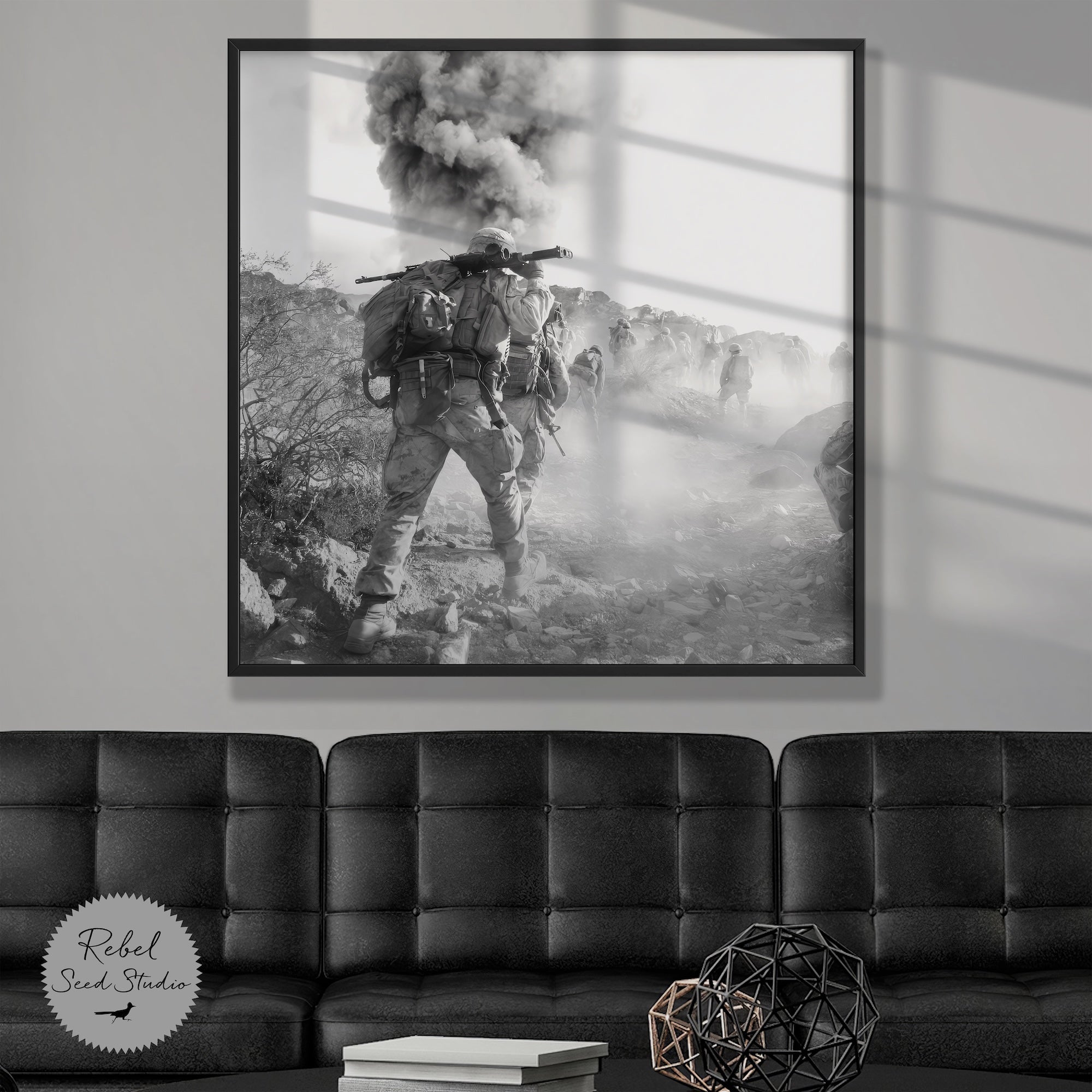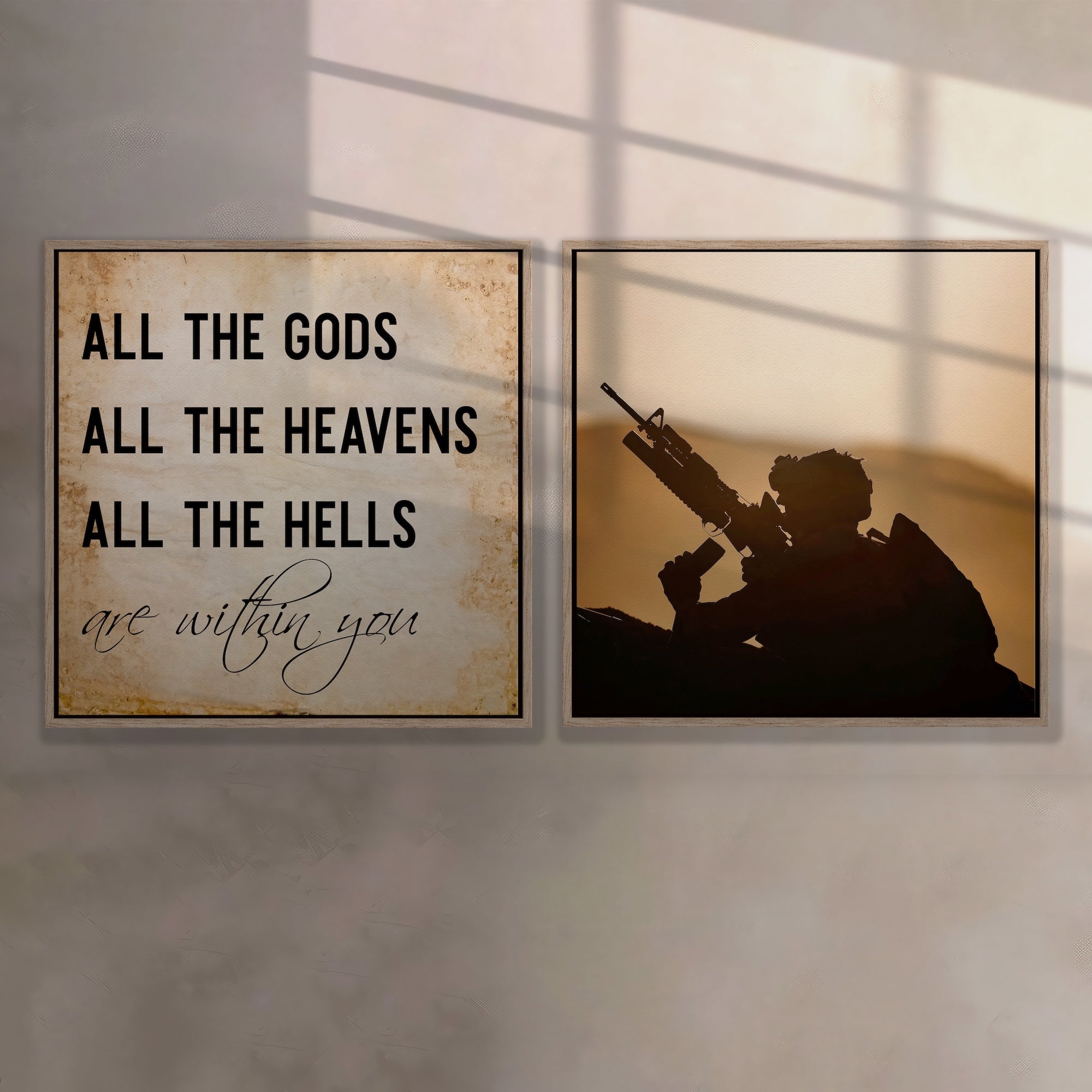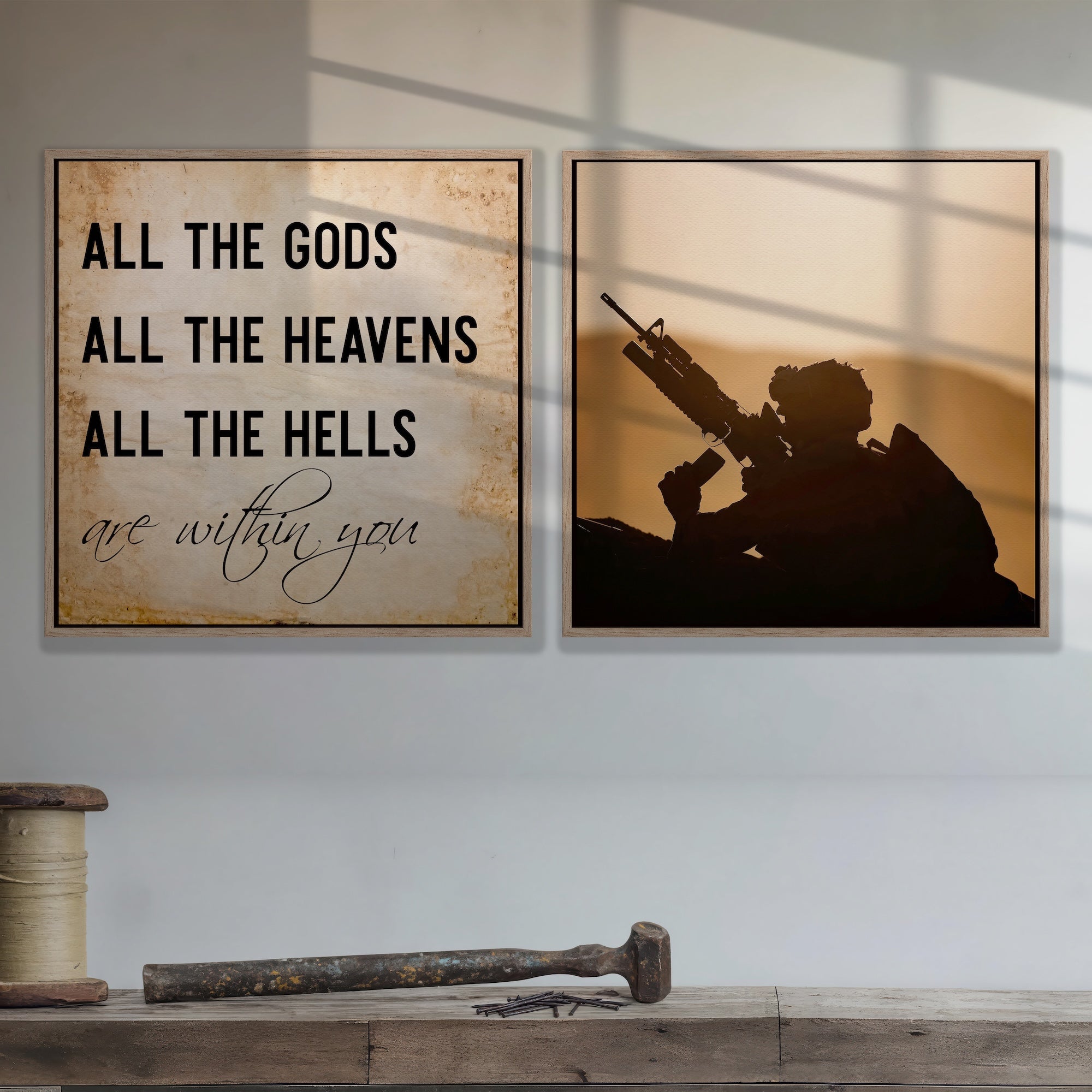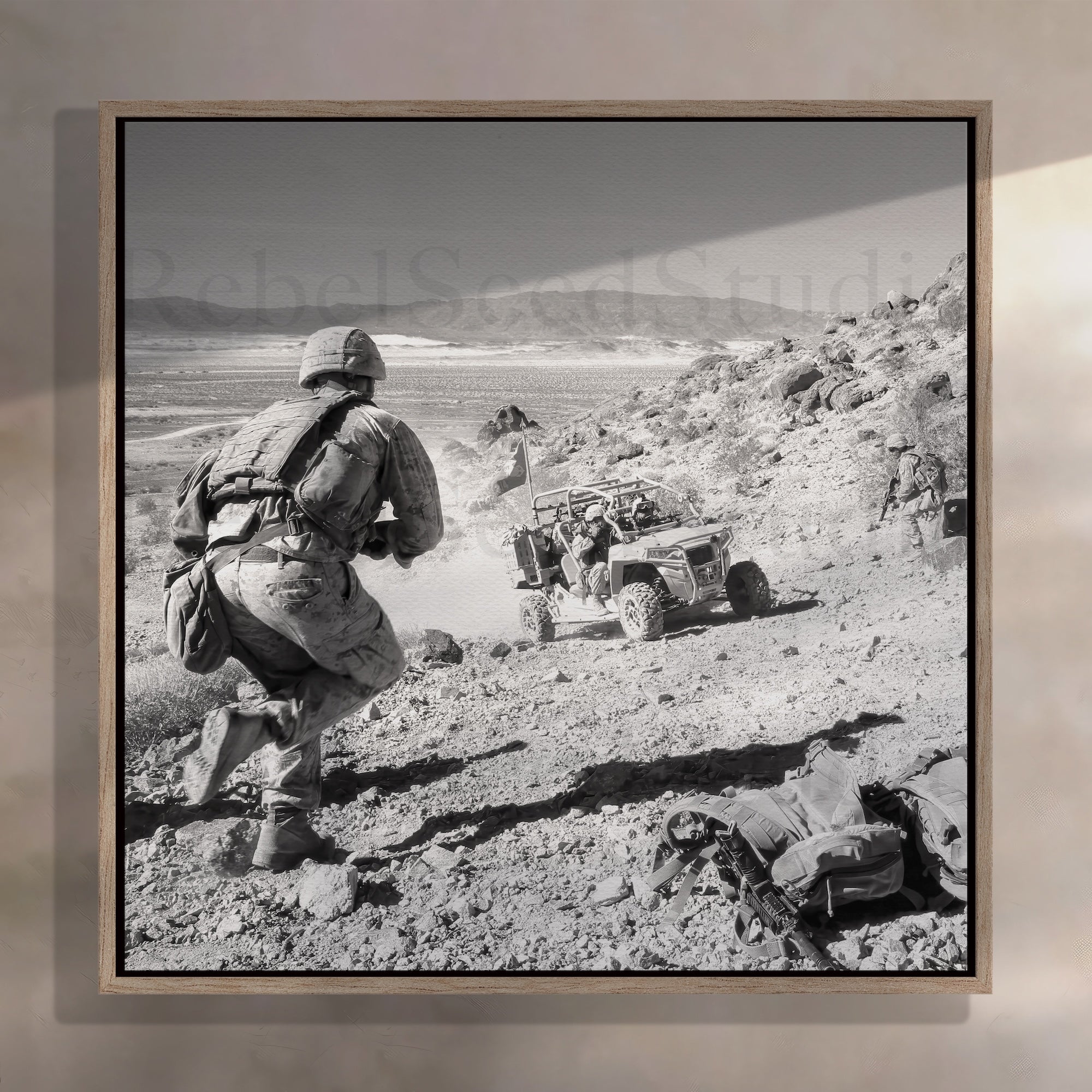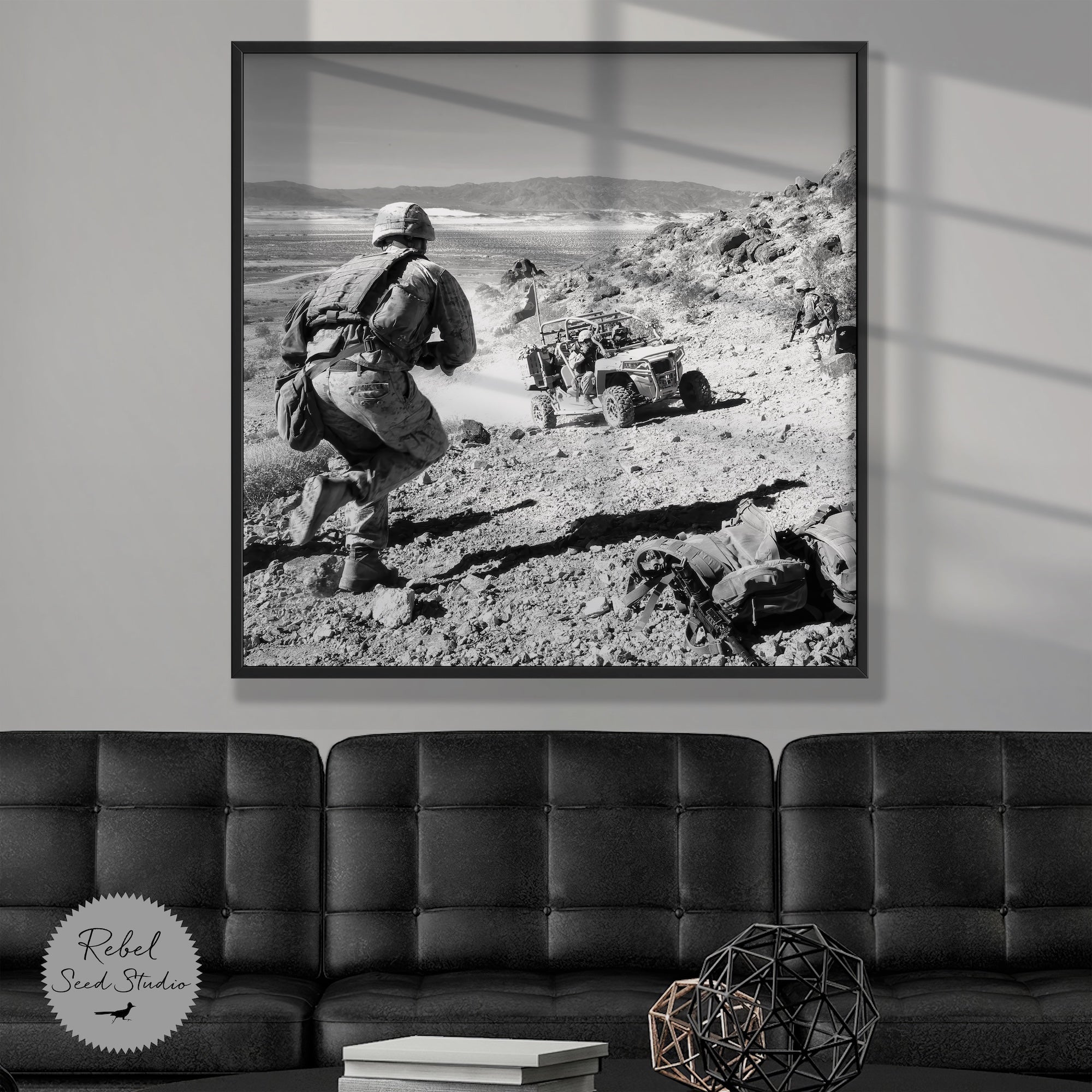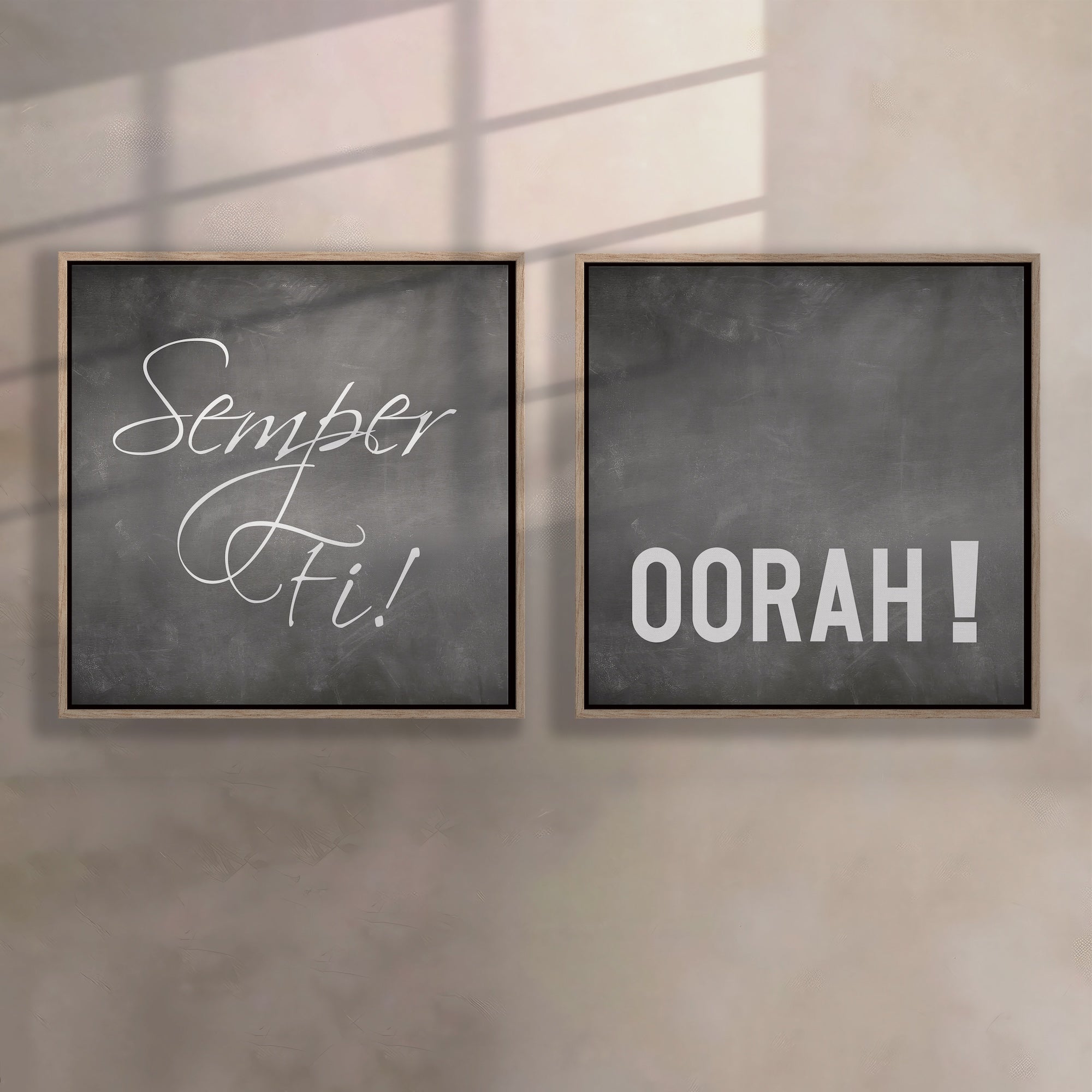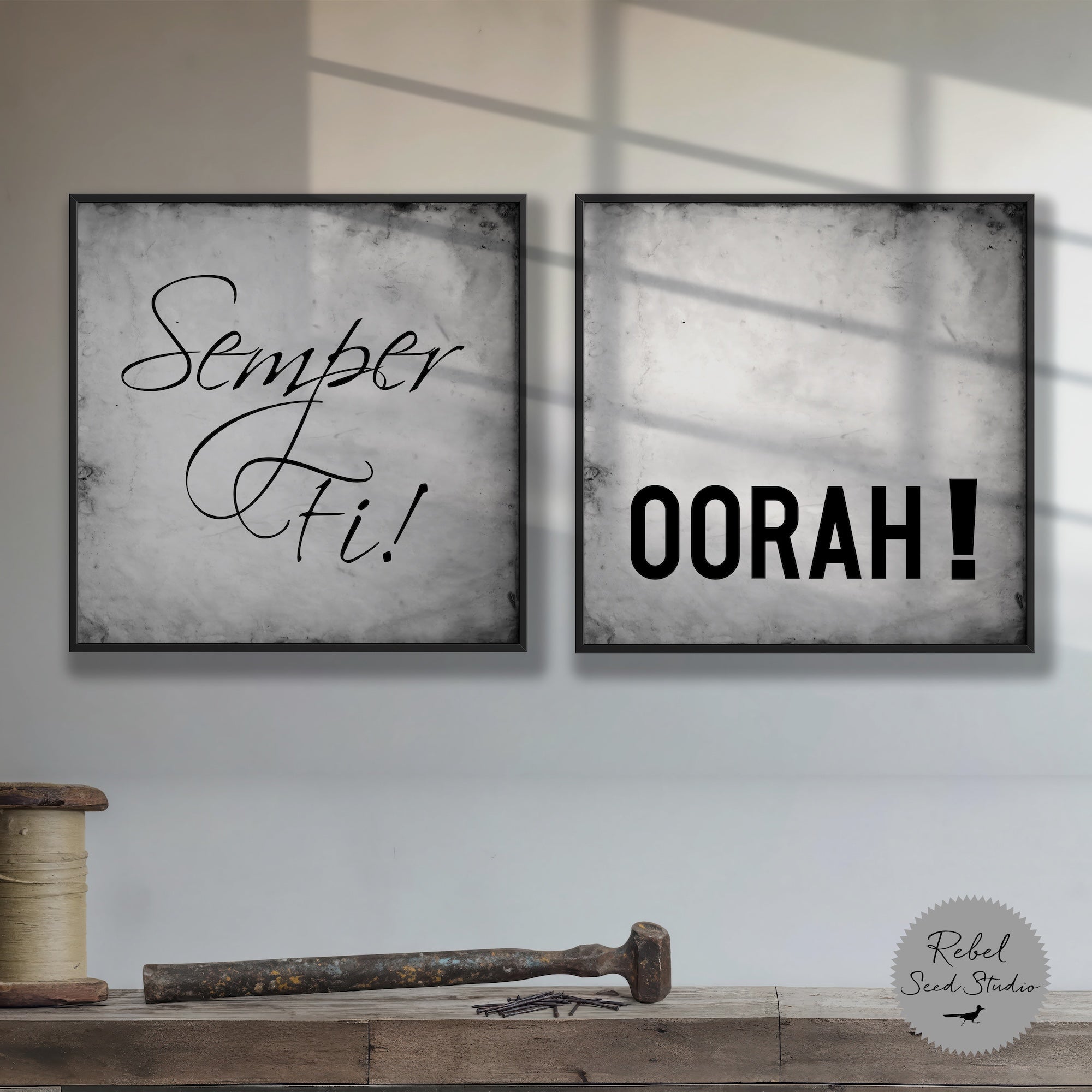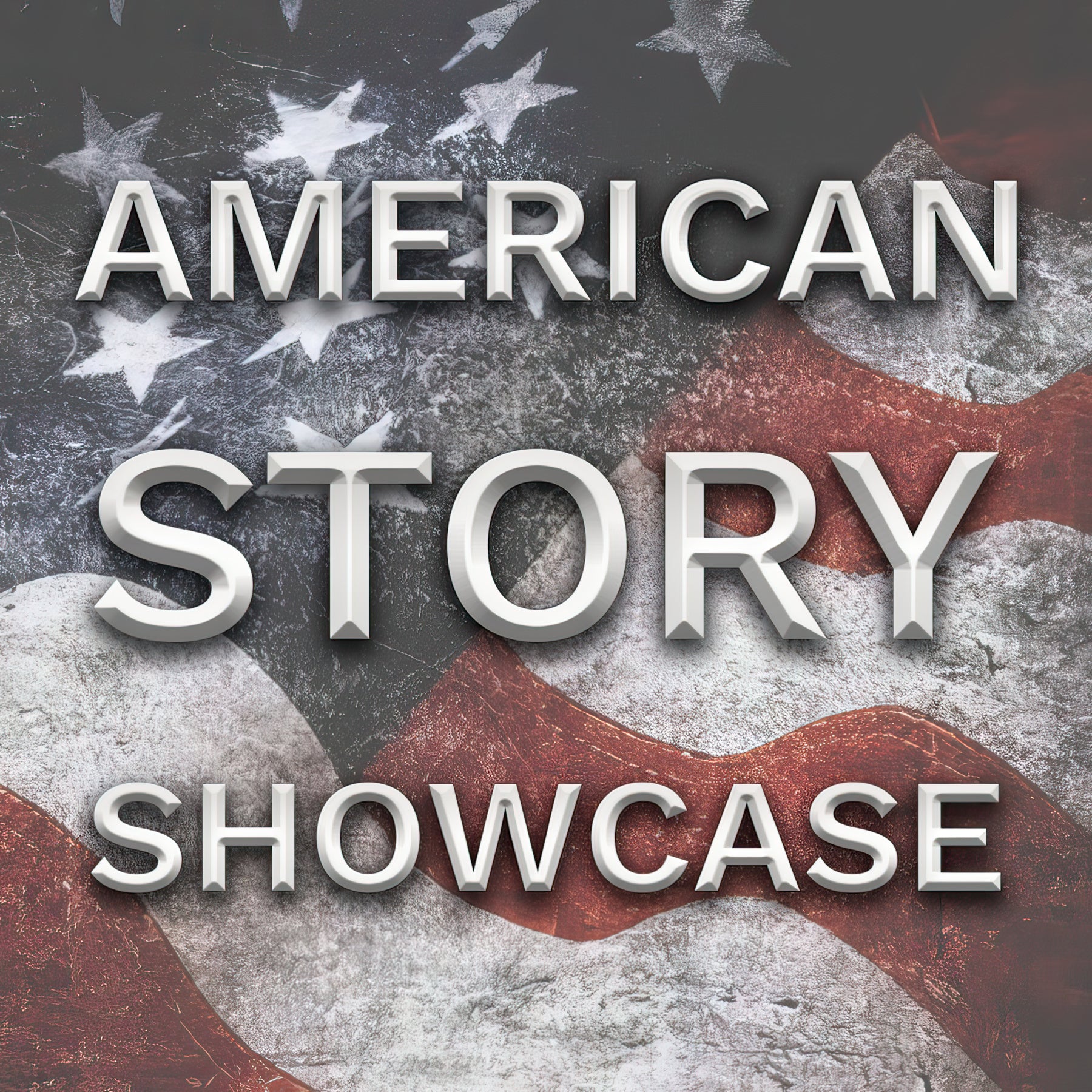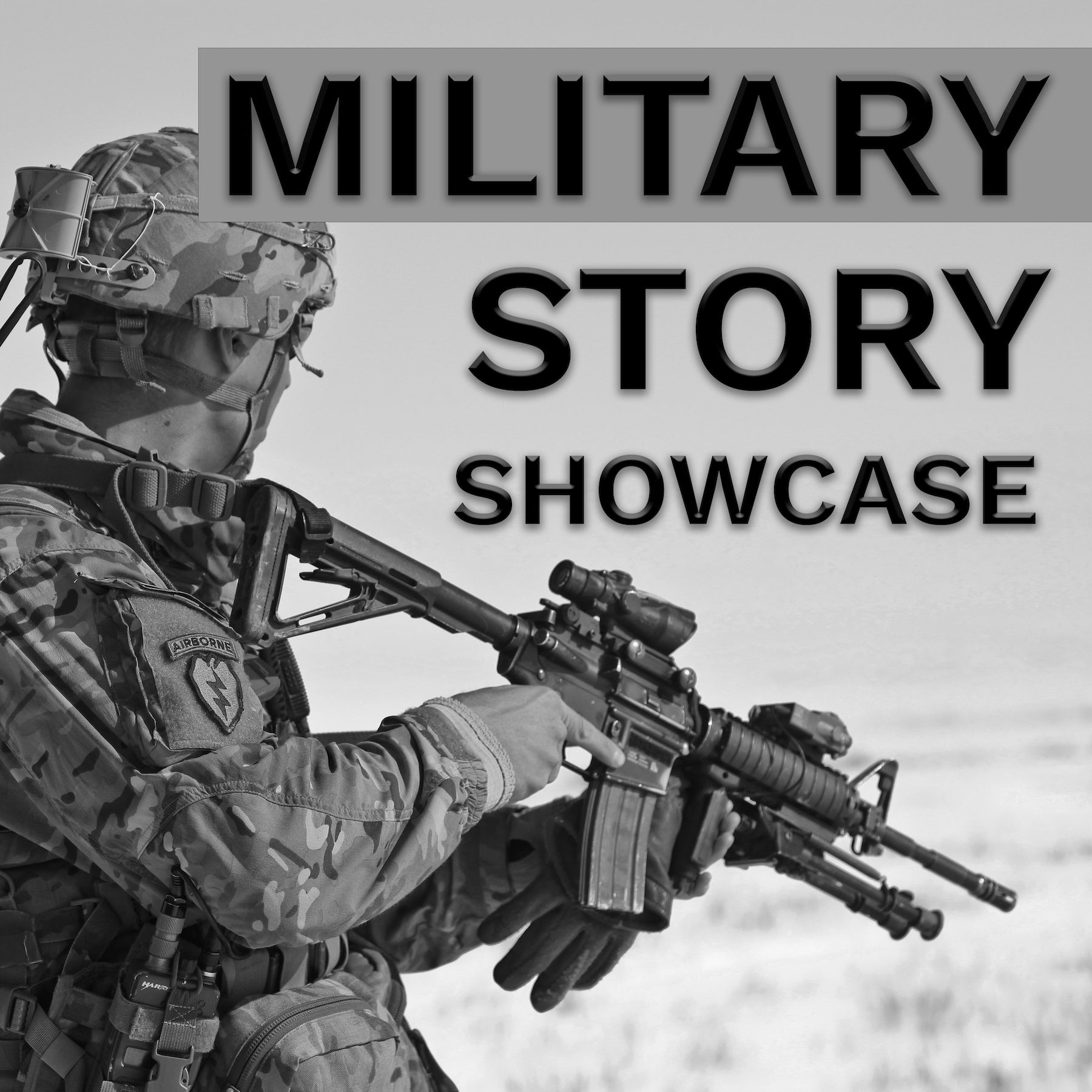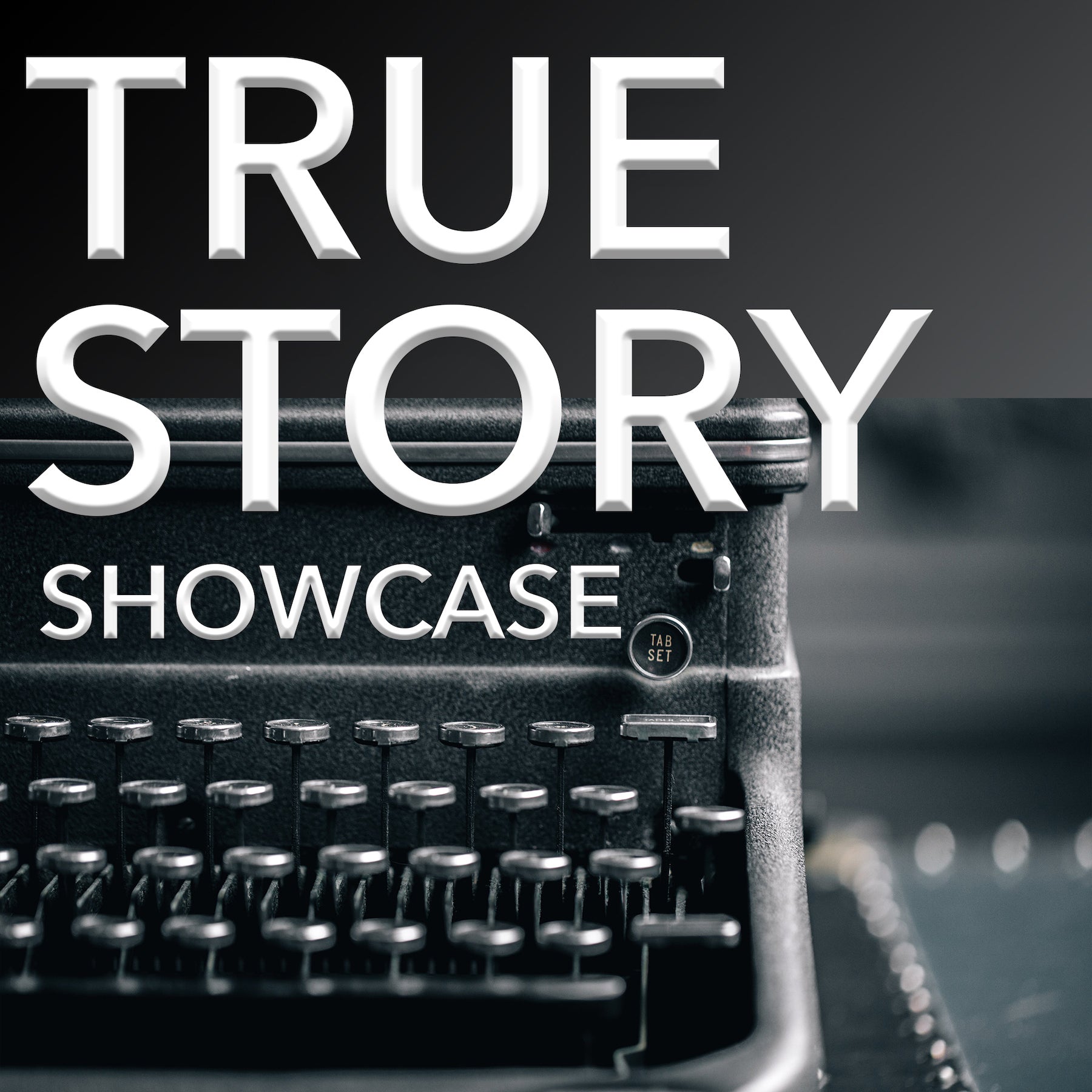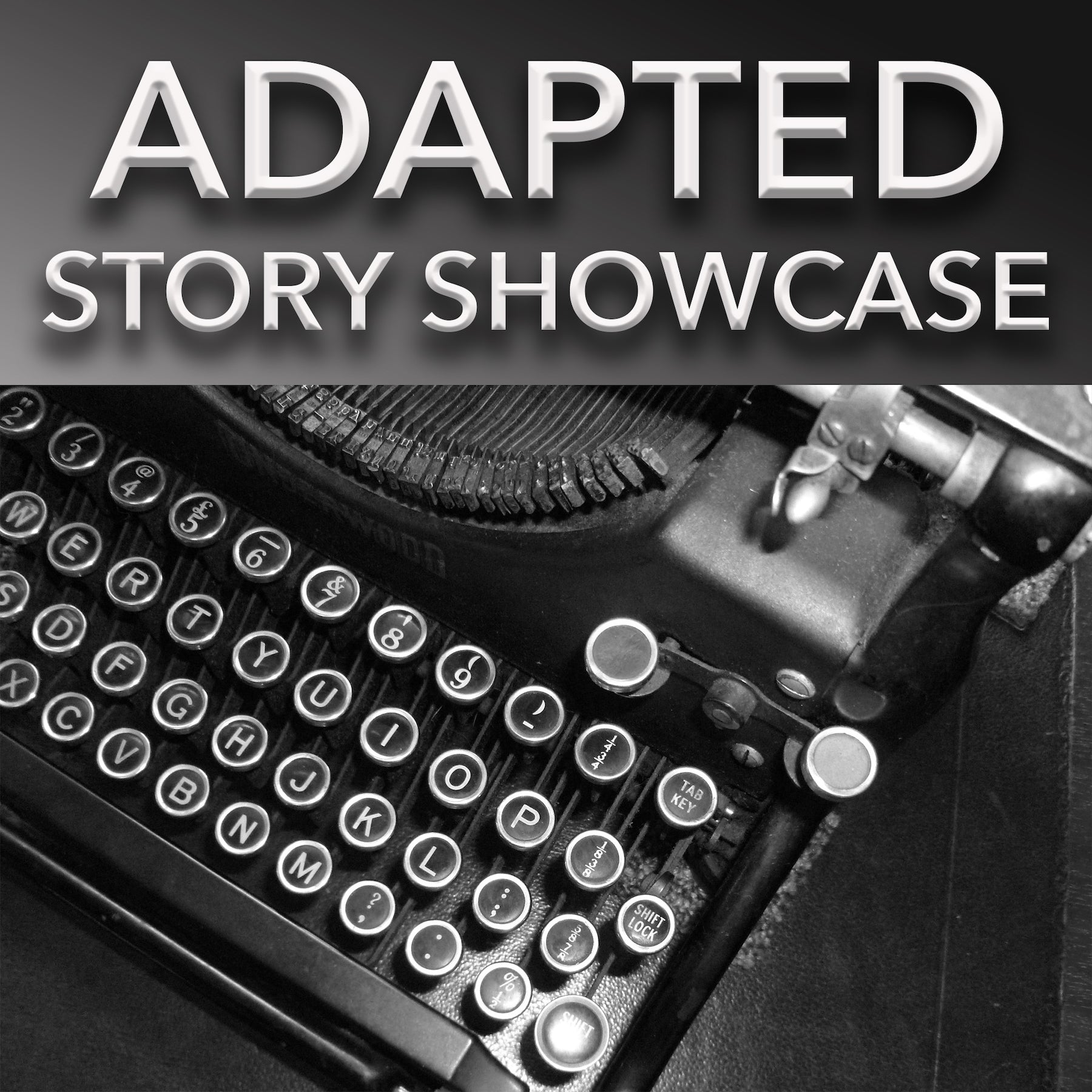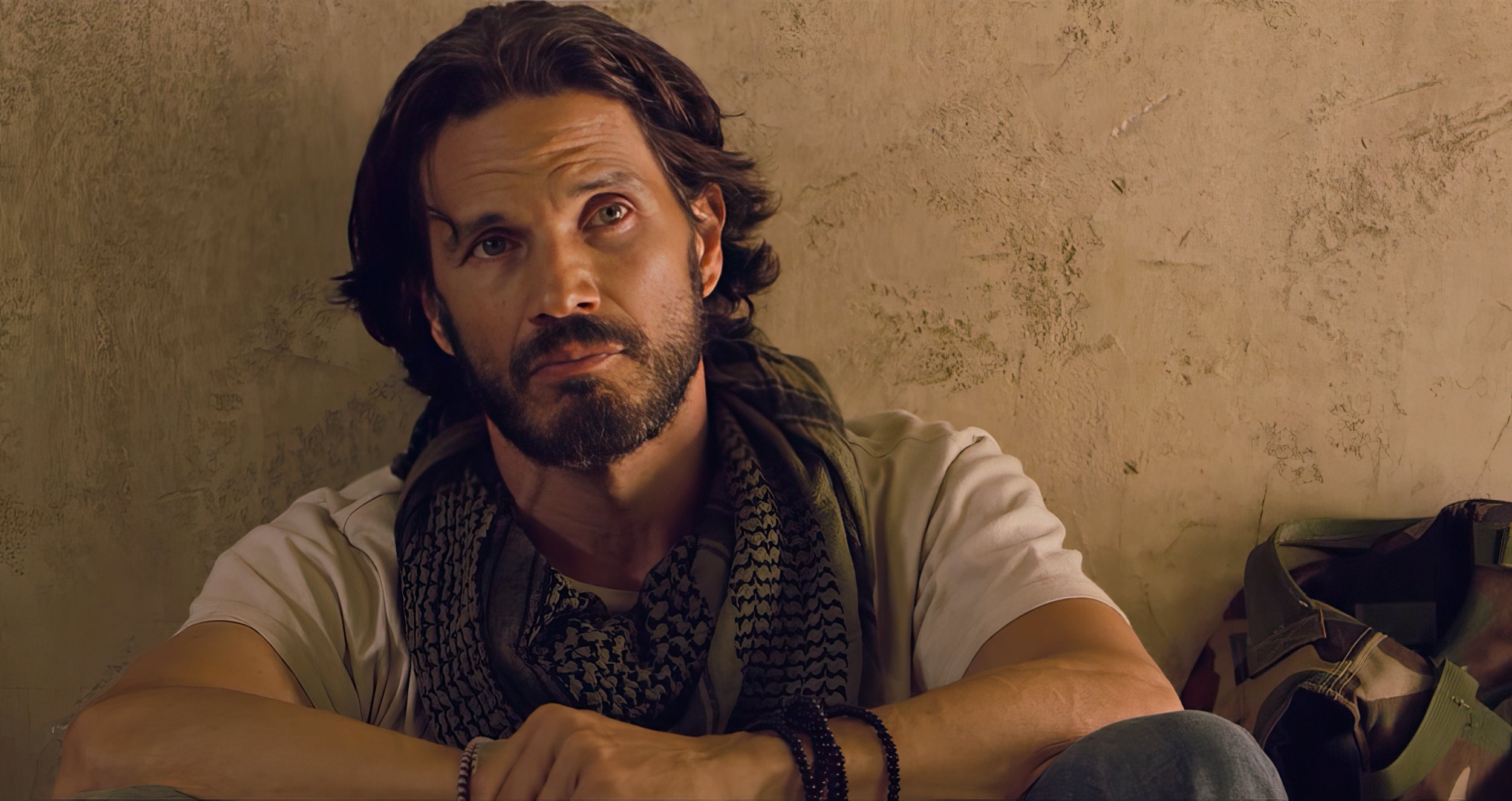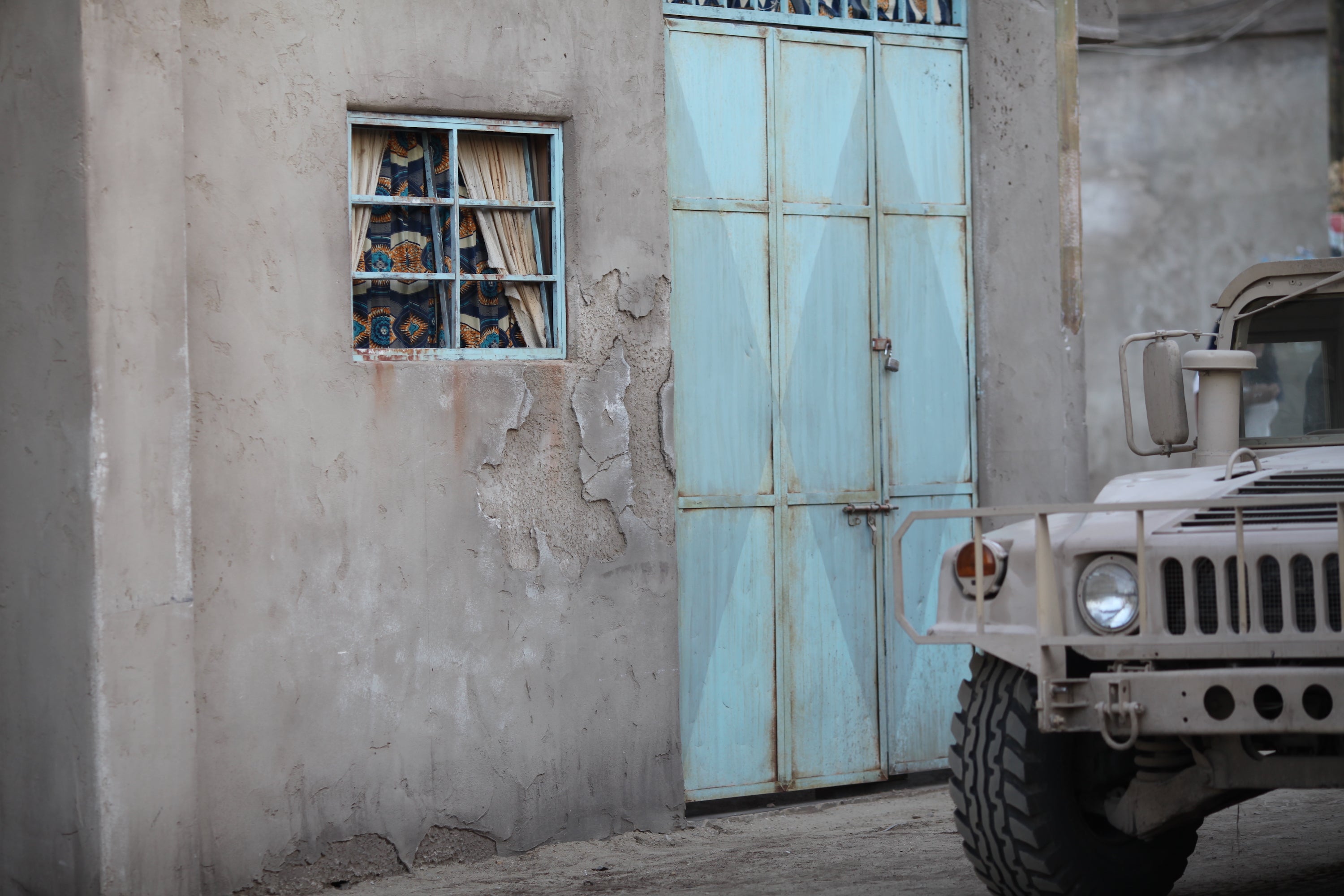
Q&A with Devil Dogs Writer/Producer Laura Cross
In this Q&A we talk with writer/producer Laura Cross about the making of the short action/war film Devil Dogs.
Q: What motivated you to write and produce this project?
Back in 2004, I actually collected a few news articles about the Marines fighting in Fallujah. Over the years, several documentaries and television programs featured the battle, and I remember thinking ‘This would make a great action film – some amazing director and studio is going to make this into a big blockbuster movie.’ The years went by and the story just stuck with me. I was surprised no one had turned it into a film.
In 2014, I read several poignant accounts of the battle, and I was overcome with this compulsion to tell the story and just get it out there. Thus the idea to produce a short film emerged. Obviously, I didn’t have the resources to make a big action flick, it had to be a more contained, personal story about the characters. Within a week of making the decision, I had hired the director, found the location, and was pulling the funds together to make it happen.
Q: Did you have any military experience?
I didn’t allow the fact that I had no military experience stop me. I had zero connections to anyone in the military at the time. After I completed the script I thought ‘I better reach out to people who have actual experience and validate what I’ve written is authentic.’ I was fortunate enough to connect with a community of military servicemen and women via social media.
There was one particular Marine veteran named Mark Cabang who had fought in the battle in 2004. He was 19 at the time, it was his first deployment and his assignment was Fallujah. He was the smallest guy in his platoon and he carried the biggest gun, an M249 SAW. He was with the 1/8 [1st Battalion, 8th Marines] Alpha Company, First Platoon. This young man was so generous with his time and so forthcoming with his recollections. I would ask him questions about specific details I had written in the script, and he would confirm what I had written was correct. His insights were invaluable, and really helped me feel confident about the script.
The director and I have been truly blessed with the opportunities and the people who have appeared in our lives during this project.
The director, Lindsay Holt, proactively reached out and contacted one of the military leaders, Colonel Mike Shupp (USMC ret.), who was the regimental commander of 10,000 Marines during the second battle for Fallujah in 2004 – and he was tremendously helpful in sharing his experiences and perspective.
I was lucky enough to have the opportunity to interview Bing West when he was promoting the release of his book “One Million Steps: A Marine Platoon At War”. Bing is a prolific military author, an authority on post 9/11 warfare, a Vietnam War Marine veteran, and was Assistant Secretary of Defense under Ronald Reagan. He traveled to Iraq and Afghanistan more than 60 times during the war, and he also wrote a book on the battles of Fallujah called “No True Glory”. Through our conversation and interview, he shared a few insights as well.
After completing production on Devil Dogs, I connected with another author and Marine veteran named Dick Camp. He was once the director of operations at the Marine Corps Museum, and he also wrote an account of the two Fallujah battles. His book is called “Operation Phantom Fury”. I ultimately ended up optioning his book for possible development as a television series or feature.
Q: Why make this film? Why tell this particular story?
If, as a nation, we are going to choose to engage in conflict, the only way to make better decisions, and informed decisions, about war and how we’re going to operate, is to be aware of the truth of what has transpired on the ground as well as behind closed doors, and to expose it for debate and investigation.
The real story of this particular event, and the motivations of the participants, are complex and multi-layered. There are many ways to approach this story: What are all the different agendas of the players, what are the consequences beyond the death and destruction, what is the media’s role in shaping public opinion and the narrative. I chose, in the length of time I have available in a short format, to focus on the individual stories of a team of young Marines and intersperse it with snippets of the media narrative – which, if it doesn’t directly oppose the Marine experience, is certainly conveying information that is foreign to them and against what they believe to be true. So whose truth is true? How do we determine what is true?
The media often has the power to choose what is hidden and what is exposed. Even if there is no malicious intent or a nefarious agenda, is it the truth if only part of the information is disseminated or only certain aspects of an event are revealed? And if the media is completely twisted or purposefully manipulated, do we have a responsibility to uncover the motive and hold the media or perpetrators accountable? We know from history that disinformation can have a significant impact on decision-making and policy, and in the case of war, on people’s lives.
I’ve personally experienced a lot of push-back and resistance to making this film. When I pitched the project to executives, the frequent response was “No one wants to know about this story and what happened to these men. This war and these battles are a black mark in American history.” I would argue we need to tell these stories, and only the marketplace can determine if people want to see them or not. I don’t think we should suppress information, or not tell a story, simply because we deem it unpleasant.
These stories are important to understanding who we are, what we’re doing, why we’re doing it, and where we’re going with it, and ultimately, they’re essential to informing our decisions about whether we want to do it again in the future or not. While it’s natural to feel that, as individuals, we have little impact on policy and the course our country takes, history has proven that ‘we the people’ do have incredible power. Information is power. It’s our responsibility to demand accurate and truthful information. No matter what side of the equation you’re on – pro-war, anti-war, neutral as Switzerland – we each have the power to affect our nation and humanity’s path, not just in war and conflict, but in every area.
Though I’m presenting these events as a narrative story, not a documentary, and have wrapped and delivered it in the form of entertainment, I feel this is how I’m able to contribute to the process, and perform what I’ve been assigned to do in this life.

Q: Because this story is based on true events, did you feel an obligation to the real men who fought in the battle?
I certainly felt a responsibility to be respectful of their sacrifices. As a writer I need to write what serves the story. My hope is that each of the characters is authentic – that they represent different perspectives of real Marines and military men in combat. I believe those perspectives and individual stories are worthy of being told. Devil Dogs is very careful not to judge one belief or value over another. It was important to me to tell a story that simply states what is known – without an agenda or message. The film certainly asks questions and may raise debate – which I think is always a good thing – but it doesn’t take a side.
What became apparent to me when making this film is the incredible divide in this country, and this strange paradox for a large contingency of Americans who hate the war but respect the men and women who serve. There are many people who opposed the war in Iraq and Afghanistan, and yet there is a conscious effort by many of those same people to honor our servicemen and women.
I think this is a new cultural experience, and it’s a challenging balancing act to achieve successfully. The people who supported WWII, also supported our troops - those men and women came home to a love-fest of parades and hero-status. Conversely, many people who opposed the Vietnam War also opposed the men who fought in Vietnam, and when those servicemen came home, they came home to a lot of hate and discrimination - they were spit on, they were called names, they were discarded by society. Now with Iraq and Afghanistan we have a new paradigm – people opposing the war but supporting the troops. How do you reconcile that in your mind? How do you honor our troops and respect their sacrifice, while at the same time disavowing the legitimacy of the war?
Q: Obviously, events in the Middle East, Iraq, and Fallujah are still reported in the media today. How did that impact Devil Dogs?
I think it helps the story maintain its relevancy. America is still questioning what our role is in the Middle East more than a decade later. Obviously when we shot the film, and then into post-production, things were very fluid in Iraq and surrounding the rise of ISIS. Even now, we don’t know where the story of Fallujah will end. It’s an ongoing narrative and conflict. War will forever be one of the oldest stories of mankind - so in a way, it will always be relevant.
Q: How closely did you work with the director to achieve your vision?
We worked very closely together. While I had a definite vision for each of the scenes while I was writing the script, in actual production it was important to me to allow the director to do what he did best, and he took the lead on the visual landscape of the film. We discussed everything in depth. We had a good creative partnership. At times he definitely pushed my comfort zone with some of the decisions. It was a give and take process.
Overall, I feel we had a similar aesthetic and he did a remarkable job capturing what I had initially envisioned. For instance, before I even crafted the script, I had a vision of a group of Marines climbing onto a Humvee to try to get cell phone reception so they can call their loved ones back home. I saw the whole scene clearly in my head. A few months later, we shot that exact scene and the director just nailed it visually. It’s another scene we were forced to cut for pacing and length – but we did end up using a shot from it as one of the poster images.
Q: You’re also credited as second unit director on the film. Tell us about that.
I did direct one scene on my own. It was really done out of necessity due to constraints on the amount of time we had available for production. The director was occupied shooting a scene at one location so I took the opportunity to direct the Marines at another location at the same time. It was a lot of fun. It was an action sequence with explosions, and guns, and choreography to get all the right moves. It was really a great scene, but it ended up on the cutting room floor because of overall length restrictions for some of the film festivals we planned to enter. But I still get the credit! It was a great experience. I definitely would love to direct again in the future.
Q: How did you work with this group of actors to elicit these powerful performances?
After I completed writing the script I talked to many Marines and some who were in the battle of Fallujah – and many of them told me the same thing: that the reason they served was for the guy who was standing next to them in battle. There is this incredible bond between these men. It was important to convey that bond through the actors.
We conducted our auditions a little differently than most auditions are conducted. We didn’t audition actors one-on-one. We put a group of five actors together to play the five Marine characters in the audition process. So the actors were just thrown in with several other actors who were there for that specific call time. It was just luck of the draw who ended up with whom. There is good in that because it allows the actors to get into a groove and play off of one another. And there is some negative, in that a good actor may end up in a group with an actor who isn’t as strong or who wasn’t prepared or doesn’t have the experience, and that can be a challenge. I was completely aware of that, and when I was making casting decisions I went back and looked at the audition footage and I focused, not just on how the actors bonded and were interacting or playing off one another, but also on the individual performances. It was truly effective for the end result. On set the actors became like a real ‘band of brothers’.
I strongly believe that an actor brings something to his role that is not on the page, because they’re bringing something of themselves, something of their experience, or something that they see in the character that expands that character and makes them more real. The real poetry of art happens when it is a collaboration, and people bring things to the project that we hadn’t expected. We encouraged ideas and suggestions. We tried to get it all hammered out in rehearsal but some of it did happen on set. It was a very collaborative process and each of the actors were able to bring things to their individual roles.
For example, I wrote the characters of Hicks and Riley as almost opposites of one another. In the scene where the photojournalist Riley, played by Michael Worth, is interviewing the Marines during the break from the battle and they’re in the safe house, Michael added three words of dialogue that showed the similarities between Hicks and Riley, and completely changed the dynamic of what I had originally written. I felt it significantly added to the emotional impact of the scene and the storyline. As a writer, I sometimes want to hold onto my words and initial intentions, and I discovered it’s more important to remain open to what an actor can bring to a character that I didn’t write on the page.
Q: The film looks similar to images we’ve all seen of Iraq. How did you achieve that in an indie production with a small indie budget?
I found an amazing professional set that replicates the environment of Fallujah. At the time, I happened to read an article about a forthcoming Clint Eastwood-directed movie called American Sniper, which referred to a location in Santa Clarita [California] that was used to shoot some of the Iraq/Afghanistan war scenes in the film. The article mentioned that Warner Bros had constructed some buildings that would cost too much to tear down so they just left them when production ended. Well, God bless Clint Eastwood and Warner Bros – I had found my set! It wasn’t inexpensive and the cost was ultimately a trade-off for the production. On a tight budget, we didn’t have enough money to rent the location as well as do much more than limited production design. Thankfully, when you look at actual pictures from the battle of Fallujah, the interior spaces were very minimal and the streets were often empty. We used that bareness to our advantage.
Q: How did you finance the film?
It was financed with private equity, loans, donations, and crowdfunding. I basically invested everything I had including my last dime, and then borrowed other people’s dimes… ha-ha.
Q: As a first-time producer, what did you learn from the process?
I think of Devil Dogs as my investment in film school. I attended UCLA-E for screenwriting and producing, but I didn’t really go to film school, per se. The experience of making Devil Dogs was invaluable in setting me up for long-term success… and more because of the things that didn’t go as expected than the things that went smoothly. After this shoot, I feel like I can handle anything - so it was worth the cost!
It was an ambitious project for a short film. Because of the subject matter, it required a specific location, costumes, props, VFX, outdoor shooting with multiple sets – all things, in retrospect, I probably shouldn’t have tried to tackle in my first production, and with a limited budget. I learned things are going to go wrong that you can’t control but crisis breeds creativity, and the unexpected solution to a problem can sometimes be a gift that is better than the original thing you intended.
In post-production, I learned I had to base my decisions on what best served the story and the goals of the project. Some of the choices were very difficult. We filmed a lot of sequences. I had to cut several scenes that I loved – and were great scenes - but they had to go because of pacing. A lot of choices were made because many of the film festivals we planned to enter had severe length restrictions – if I had taken that into consideration prior to production we probably wouldn’t have shot as much footage. I would have written a shorter short!

Q: What types of challenges did you experience making this film?
The production was so much fun for everyone. It was an incredibly positive experience. There were a lot of challenges – I could probably write an entire book just about the challenges and what I learned from them! I definitely think the process has made me a better filmmaker going forward.
The old saying “whatever can go wrong will” pretty much fits: going over-budget, losing forty-percent of the crew five days before the shoot, having an actor arrive late and drunk on set the first day and being forced to fire him and quickly find a replacement, no electricity or running water on set, having a PA abscond with the craft services money the first morning and everyone on set starving while we scrambled to get someone else to pick up food and coffee, temperatures soaring close to 100-degrees, dirt storms causing sand to get into everything including all the equipment, losing permission for our drone shoot just hours prior to shooting the scene, an actor being injured on set, the death of an actor’s brother the day prior to beginning principal photography, expensive custom-designed prop weapons malfunctioning and having to stop production while they were repaired, the list goes on and on.
I was so concerned about working with the cat on set. I think I was more concerned about the cat than anything else… ha-ha. We shot in a remote location and I was terrified it was going to run off and become a predator’s afternoon snack. Because how do you train a cat, right? Dogs, yes – felines, not so much. But apparently they are trainable. Schuster the Cat was a consummate actor and his human, Steve Berens, was top notch.
Q: Is there anything you would do differently next time?
I would invest more time in pre-production. It’s funny because, as a writer, I spend an enormous amount of time in researching a story and outlining scenes and creating beat sheets before I ever start actually writing the script and yet, as a producer, I didn’t allocate enough time or even recognize the necessity of doing that same process in pre-production.
Q: How do you respond to the criticisms about inaccuracies depicted in the film?/h4>
It’s a fine line. We wanted to be as accurate as possible but there are certain things that, for the storytelling or the visual aesthetic or the limited budget we needed to maintain, it just wasn’t possible to be 100% authentic to the real experience. The director and I both agree that we wish we had spent more time in pre-production and working with the military consultants to create a more accurate experience. The good thing is none of the inaccuracies impacted the story. For example, the inaccuracies in the Marines’ uniforms didn’t hurt the story.
I think it’s challenging for a military audience to accept inaccuracies on film, because obviously in the military all of the details are so important – you can’t have inaccuracies because it’s literally life or death. My hope is that most of the audience will be able to forgive us for some of the little mistakes and tune into the story and focus on that.
Q: The production has aligned with a charity called Canines For Veterans. How did that come about?
It was important to me, even prior to production, to give to the military community in some way. I felt it was the right thing to do. I’m using their story – even though none of the characters are real people, it’s based on true events. There are many wonderful veteran’s organizations. I carefully considered who I wanted to align with before selecting Canines For Veterans.
Canines for Veterans is a non-profit organization that provides service dogs at no-cost to wounded warriors and veterans suffering from PTSD. They have a win-win-win system. The dogs are rescue dogs (so they are saved from potential death and given a purpose), the trainers are military prisoners (these are men who have served their country but committed an infraction and are now serving time and this provides them the opportunity to give back), and the recipients of the trained dogs are veterans, who acquire them at no-cost.
The Devil Dogs production gave 10% of donations and contributions we received for the project to the organization, and has pledged 10% of any revenue the film may make in the future, plus we're donating 100% of sales of "Angel", the Devil Dogs theme song.
Q: What are your feelings on being a female writer who is writing in predominately male genres?
It didn’t really occur to me that it may be considered odd by some people that a woman wrote this particular story - not only a woman, but a woman who has no military experience – or that I write action and violent true-crime stories. I understand where those questions come from – there is a level of curiosity about it, and perhaps a novelty. And I think that’s fair.
The truth is, I’m simply a writer. I don’t want to be singled out as a female writer. Part of being a writer is cultivating an awareness of others: who they are being, why they think what they think, why they feel what they feel, what they value and believe, and ultimately how their beliefs and emotions inform their words, their decisions, and their actions. Male writers have been writing female characters since forever. It’s no different for a female writer to craft male characters. A key to being a good writer is to have an awareness and understanding of who you are and who others are – so you can capture it as authentically as possible and put it on the page.
Q: There is a major discussion about how Hollywood doesn’t view female directors and filmmakers as being as viable or valuable as their male counterparts. Only a small percentage of women direct or write the big studio releases. What’s your experience of this?
I’m a firm believer that a project that has value in the market will get produced regardless of if the director or writer is male or female. Some people stereotype, which leads to fear and apprehension – you know “women are emotional, women are not leaders, they can’t bring the film in on time or on budget, they only want to tell small ‘feminine’ stories that will lose money at the box office” - those types of stereotypes. Part of what needs to happen is we have to smash those stereotypes and prove that they’re inaccurate.
At the end of the day, if someone doesn’t want to play with me, then I can take my marbles and go play elsewhere. That’s the beauty and opportunity in independent filmmaking. You don’t have to rely on an executive at a major production company or studio to open the door for you… simply go out and make the project on your own.
Q: There are plenty of men writing in this genre already, why not use your status as a woman to write and produce films about and for women? Clearly there are not enough of those stories being told?
It’s hypocritical to imply that, because I’m a woman, I should only write certain types of stories. Demanding that a writer – whether male or female - stay within a defined box, is not equality.
I don’t agree that Devil Dogs is a film about men for men. I don’t necessarily believe there are “male” and “female” genres. Do only men see war films? Are only men interested in violent crime stories? Most stories are universal, regardless of the sex of the main characters. The stories I write are about the human experience. As a woman, I will never experience war or combat. I won’t even be forced to mentally consider the experience, as I suspect most men in our society will – even those who don’t go into the military. But I do understand loyalty, friendship, fear, courage, injustice, loss, pride, commitment – these are all part of the human experience. The details – the framework – of the story is almost irrelevant. The plot is simply a device to convey these elements that we all can relate to. Most people who resonate with the story of “The Godfather” are probably not Italian mobsters but they still feel the emotional impact of that film because we all have family and personal ambitions, which are the core of the story – the mafia and gangsters are simply a plot device to frame those other story elements.
What’s next for you?
I have a full slate of projects in various stages of development. They’re all true stories – crime, war and inspirational biopics. I‘ve also been pitching Devil Dogs as an anthology television series, which would allow me to explore the material much deeper. Plus, I run a boutique publishing company that publishes books based on true events with potential for film or television adaptation, and I have a few books coming out this year. So, I’m keeping pretty busy.



